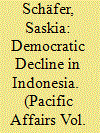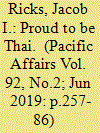| Srl | Item |
| 1 |
ID:
165724


|
|
|
|
|
| Summary/Abstract |
The Council of Indonesian Islamic Scholars (MUI) has exerted increased political influence in Indonesian politics since the fall of Suharto. Constituted by representatives from various Muslim civil society organizations, the Council was originally intended by Suharto to serve as a political representative for Indonesia’s two largest civil society organizations, the Muhammadiyah and the Nahdlatul Ulama. This article argues that in addition to its own non-democratic structures and its fatwas opposing democratic values, the MUI has contributed to Indonesia’s democratic stagnation and decline in two ways: by undermining the authority of elected state representatives through its anti-pluralist stance and its epistocratic claims, and by imperiling the fragile but functioning balance of religion and the state through its undermining of the long-established religious civil society organizations.
|
|
|
|
|
|
|
|
|
|
|
|
|
|
|
|
| 2 |
ID:
165726


|
|
|
|
|
| Summary/Abstract |
Large-scale infrastructural development schemes are currently experiencing a worldwide political revival. Beyond establishing physical connections over distance, enhancing trade relations, and enabling service delivery, such schemes also play a central role in the construction of political entities. For the Association of Southeast Asian Nations (ASEAN), infrastructure development is crucial for the advancement of regional connectivity. Its Master Plan on ASEAN Connectivity includes large-scale projects such as the trans-ASEAN highway, trans-regional power grids, and a regional gas pipeline network. Linking Henri Lefebvre’s conceptualization on the production of space with recent literature on the role of infrastructure imaginaries, this paper explores how the region’s future is envisioned in the Southeast Asian dream of connectivity. The study primarily relies on a hermeneutic analysis of video releases that promote the Master Plan. It shows that – similar to other infrastructure projects – the connectivity dream is closely related to imaginaries of movement and modernity. However, as it is almost exclusively an urban vision, the connectivity agenda seems not only to interconnect and homogenize regional space but it may also enforce preexisting disconnections and so potentially lead to more fragmentation.
|
|
|
|
|
|
|
|
|
|
|
|
|
|
|
|
| 3 |
ID:
165725


|
|
|
|
|
| Summary/Abstract |
In contrast to the veneer of a homogenous state-approved Thai ethnicity, Thailand is home to a heterogeneous population. Only about one-third of Thailand’s inhabitants speak the national language as their mother tongue; multiple alternate ethnolinguistic groups comprise the remainder of the population, with the Lao in the northeast, often called Isan people, being the largest at 28 percent of the population. Ethnic divisions closely align with areas of political party strength; the Thai Rak Thai Party and its subsequent incarnations enjoy strong support from Isan people and Khammuang speakers in the north while the Democrat Party dominates among the Thai- and Paktay-speaking people of the central plains and the south. Despite this confluence of ethnicity and political party support, we see very little mobilization along ethnic cleavages. Why? I argue that ethnic mobilization remains minimal because of the large-scale public acceptance and embrace of the government-approved Thai identity. Even among the country’s most disadvantaged, as are Isan people, support is still strong for “Thai-ness.” Most inhabitants of Thailand espouse the mantra that to be Thai is superior to being labelled as an alternate ethnic group. I demonstrate this through the application of large-scale survey data as well as a set of interviews with self-identified Isan people. The findings suggest that the Thai state has successfully inculcated a sense of national identity among the Isan people and that ethnic mobilization is hindered by ardent nationalism.
|
|
|
|
|
|
|
|
|
|
|
|
|
|
|
|
| 4 |
ID:
165723


|
|
|
|
|
| Summary/Abstract |
Financial nationalism has received little attention in the literature on Chinese nationalism. Nor has China been a focus of the emerging literature on comparative financial nationalism. This is surprising as financial matters were central to modern Chinese nationalism when it began to take shape in the 19th and the 20th centuries and financial nationalism remains an influential ideology in contemporary China, which has undoubtedly become a major actor in the international financial system today. Our exploration of Chinese financial nationalism seeks to begin to fill this gap in both sets of literature. This article examines three areas of concern shared by Chinese financial nationalists past and present – currency, foreign financial institutions in China, and international borrowing/lending. We find that, as China’s position in the international power hierarchy has evolved, the nature of financial nationalism has changed, from a largely inward and defensive orientation to an increasingly outward orientation. Our study also reveals diverse strands of thinking among Chinese financial nationalists, both now and in the earlier historical era, according to whether they hold a zero-sum or positive-sum conception of international financial relations. The case of China shows the richness of financial nationalism and highlights the importance of a nuanced understanding of this phenomenon.
|
|
|
|
|
|
|
|
|
|
|
|
|
|
|
|